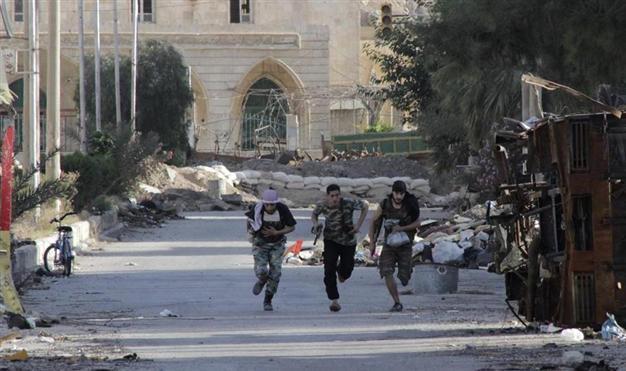Turkey urges stronger stance against Syria after US accusations of chemical weapon use
ANKARA / WASHINGTON

Members of the Free Syrian Army run to avoid a sniper in Deir al-Zor, June 13, 2013. Picture taken June 13, 2013. REUTERS/Khalil Ashawi
Turkey says a U.S. announcement that it has conclusive evidence the Syrian regime used chemical weapons against opposition forces corroborates its own findings and is urging the international community to take a decisive stance against the regime's "atrocity."A Turkish Foreign Ministry statement released Friday calls on the international community to "unite and openly manifest its stance" against Syrian President Bashar Assad. It stated the regime's attacks must be halted and a "democratic transition process" must start in Syria.
Asked about the U.S. assertions, Turkish President Abdullah Gül said: “These are very serious assessments. Using chemical weapons is like a small nuclear weapon. The dimension of this is very dangerous. We know what has been experienced in Halabja. I am sure all diplomats and analysts are evaluating these claims. If this finding has been proved precisely, then it is certain that all things will enter another phase.”
Turkey has said preliminary tests on some injured Syrians indicated that chemical weapons had been used. The country is a major backer of the Syrian opposition.
U.S. officials said President Barack Obama has authorized sending weapons to Syrian rebels after the White House disclosed that Assad's forces used chemical weapons.
US to provide direct military support to Syria rebels
The United States on June 13 accused Syria of using chemical weapons against the rebels, and announced it would offer "military support" to the forces battling President Bashar al-Assad. The declaration - alleging that up to 150 people have been killed in chemical weapons attacks - means that Syria has crossed what President Barack Obama has called a "red line" in the crisis.
But Washington has not yet decided whether to implement a no-fly zone over Syria, where more than 90,000 people have been killed since the conflict erupted in March 2011, according to the United Nations.
"Our intelligence community assesses that the Assad regime has used chemical weapons, including the nerve agent sarin, on a small scale against the opposition multiple times in the last year," deputy national security adviser Ben Rhodes said in a White House statement.
"The intelligence community estimates that 100 to 150 people have died from detected chemical weapons attacks in Syria to date," he said.
"The president has been clear that the use of chemical weapons -- or the transfer of chemical weapons to terrorist groups - is a red line for the United States," Rhodes noted.
Rhodes did not say if the United States was moving towards directly arming the rebels battling Assad, but said Obama "will be consulting with Congress on these matters in the coming weeks." "The United States and the international community have a number of other legal, financial, diplomatic, and military responses available," he said.
"The president has made a decision about providing more support to the opposition. That will involve providing direct support to the (rebel) Supreme Military Council. That includes military support," Rhodes said, without offering details.
Meanwhile, "It's been reported to me by reliable sources that the president... has decided, he's reached the conclusion that they used chemical weapons, and that they are going to provide arms to the rebels," U.S. Senator McCain told reporters.
Complied from AP and Agence France-Presse stories.
















